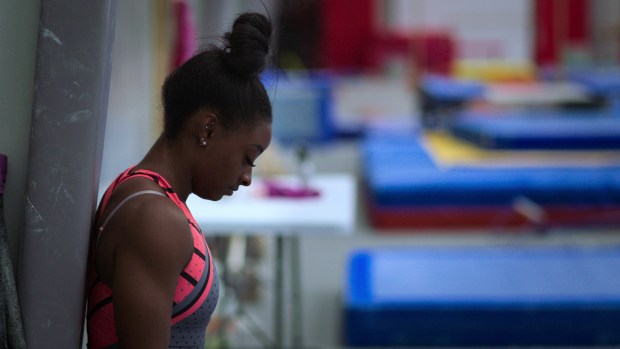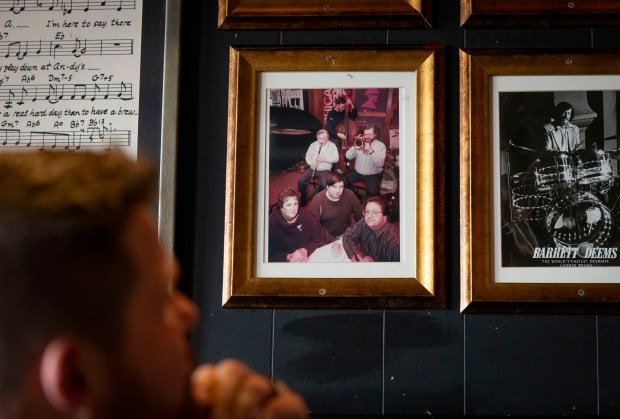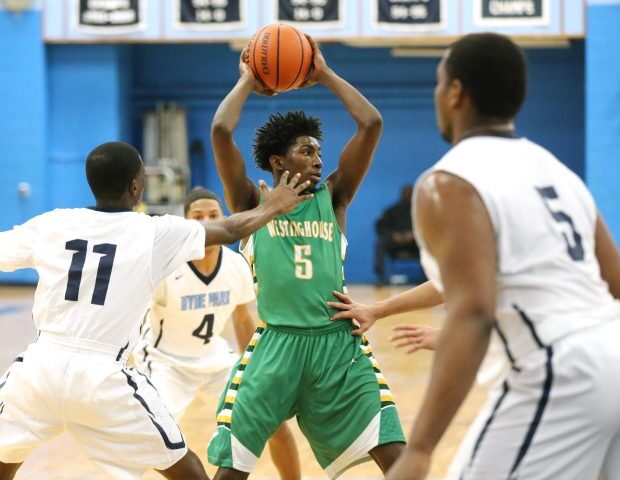Ahead of the 2024 Summer Olympics in Paris, where gymnast Simone Biles is set to compete, the two-part Netflix documentary “Simone Biles Rising” focuses on a pivotal event in her athletic career: Pulling out of the 2020 Tokyo Olympics because of the twisties, a term of art describing the disorientation a gymnast experiences mid-maneuver when they lose their sense of place in the air.
Here’s how her coach Laurent Landi puts it: “She could not sync her body and her mind together to compete. Something broke.” The only way to cure the twisties, he says, is to take time off and try to understand why it’s happening. “And most of the time, it’s unrelated to gymnastics.”
The subtext to all of this is Larry Nassar, the team doctor who was charged with sexually assaulting gymnasts. Biles was among them, and she speculates that a delayed trauma response to her own assault and Nassar’s conviction ultimately impacted her performance in Tokyo. “I didn’t get the proper care before because I just thought I was OK,” she says. “But your mind and your body are actually the first ones to say, ‘Actually, no.’”
The first two parts of the docuseries are open-hearted and a straightforward conversation with Biles about her experience at the 2020 Olympics (which took place in 2021, delayed due to the pandemic) and her life in the years since. Director Katie Walsh will continue to follow Biles in Paris for two forthcoming episodes; Netflix has not said when those will premiere.
Tom Brady and Michael Strahan’s sports media production company Religion of Sports is one of the producers here, along with the Olympic Channel, which is operated by the International Olympic Committee. That suggests a certain amount of careful curation and image-making is at play and the first 15 minutes or so have the jumpy, frenetic pacing of a teaser. But once it settles down and just lets Biles talk, “Simone Biles Rising” proves to be engrossing. It helps that Biles is extremely likable and comfortable in front of the camera. To its credit, the documentary doesn’t have the pushy approach you typically see in the pre-produced segments that have long been part of NBC’s Olympic coverage.
Will a dedicated Netflix camera crew following Biles at the Paris Games increase the intensity she’s under? Or will it feel indistinguishable from all the other media coverage she’ll be facing? Maybe Walsh & Co. will be a safe space, since they’ve already established a rapport. (Walsh previously worked on the Facebook series “Simone Biles vs. Herself,” which followed her during the last Olympics.) Either way, modern athletes are expected to not only be the best in their sport, but media savvy as well. It’s a lot to shoulder. That said, Biles is an adult. She’s remarkably open. And she’s OK’d this kind of documentary twice now. She knows what’s involved. She’s such an exciting athlete to watch, but often that obscures her human frailties and again and again, she’s making choices that underscore this complexity as part of her public image. She didn’t, for example, stop filming the Facebook series when everything fell apart in Tokyo and the last thing she probably wanted was a camera in her face.
She’s also learned to set boundaries for herself around social media to manage her anxieties, whether limiting comments or her own usage of the apps. Reading one nasty post in the wake of her decision in Tokyo, an ironic smile crosses her face, reflecting on the non-existent expertise of the person passing judgment: “Sitting on your couch, watching me from home. OK.” The subtext is blunt: You try doing anything close to what I’ve accomplished — while risking serious injury — and then we’ll talk.
The documentary doesn’t utter the word “misogynoir,” but a combination of racism and sexism was absolutely driving the harsh responses Biles weathered after pulling out of the Tokyo Games. Dominique Dawes was part of the “Magnificent Seven” 1996 Olympic team and she talks here about what it means to be one of the few Black gymnasts on a team: “My body type was not what (the judges) embraced. My hair wasn’t what they were looking for … I knew that who I was was automatically a deduction.”
Dawes also talks about the extreme expectations placed on elite gymnasts. Her teammate Kerri Strug famously helped the U.S. win gold in 1996 after doing a vault on an injured ankle: “We all were injured, we all were beat down and battered,” Dawes remembers. “She’s standing at the end of the vault runway, visibly in physical pain and emotional pain as well. And her coaches are telling her, ‘You can do it.’ That would be nerve-wracking as an adult (and) these are young teenagers that have given up their whole childhood and there are nearly 40,000 people screaming for her to go because it’s for your country.” Looking back, she says, “That was not right.”
We see a montage of Olympic footage from decades past of gymnasts hurting themselves. One crashes her face into the balance beam after a backflip, another falls on her head after a vault. “In the ’80s and ’90s, our ideas about what was normal within the sport were a bit warped. But there was a deep belief that this was the way to achieve success,” says Dr. Onnie Willis Rogers, a professor of psychology at Northwestern University and a former gymnast who is interviewed here as well.
In some of her sit-down interviews, Biles is wearing a nameplate necklace that reads “Owens” — her married name. She and NFL player Jonathan Owens wed last year, and despite his own athletic career, he might be more famous for a podcast appearance in which he referred to himself as the “catch” in their relationship. The backlash from fans was swift, but Biles brushed it off. Being married means her life isn’t just focused on the gym. That necklace might be nothing more than a piece of jewelry she wears every day. Or it might be a subtle but more pointed message she’s getting across.
At 27, Biles is competing again because she can — she is the most decorated gymnast in history and she’s still a top performer — and also because she wants to go out on her terms. But she doesn’t appear consumed with the idea that the 2024 Olympics are some kind of redemption story.
Despite the documentary’s title, she doesn’t talk about herself in such self-dramatic terms — of a phoenix rising from the ashes. The series is smart to follow suit, simply allowing her to take us through what was going through her mind both during and after Tokyo, and allowing us into her headspace — and her vulnerabilities — in the lead-up to Paris.
“Simone Biles Rising” — 3 stars (out of 4)
Where to watch: Netflix
Nina Metz is a Tribune critic.





